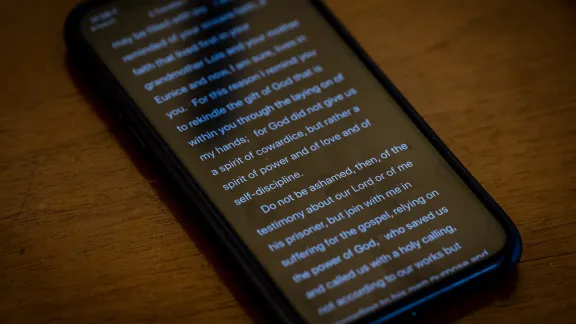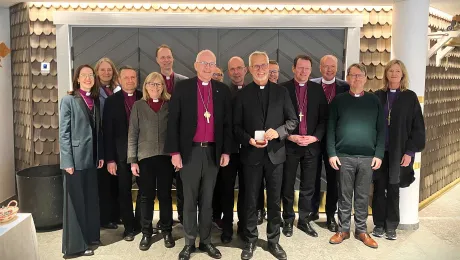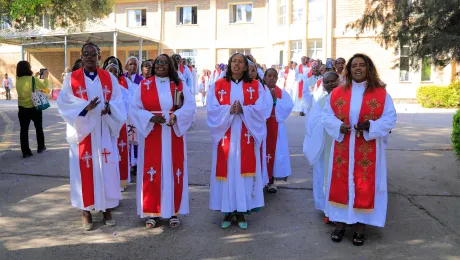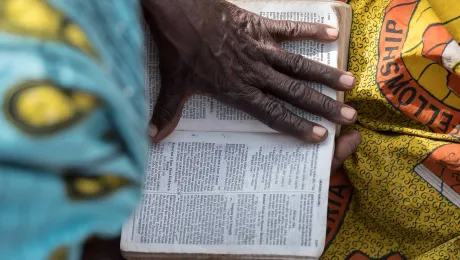
As we consider how best to organize and structure worship in a time of pandemic, a guiding question is one that applies to every situation: does the liturgy translate the Gospel for this moment, in this context? Photo: LWF/A. Danielsson
A liturgical criterion
As we consider how best to organize and structure worship in a time of pandemic, a guiding question is one that applies to every situation: does the liturgy translate the Gospel for this moment, in this context? This question (and its answer) is the criterion for our worship and the liturgical order that gives shape to worship. The criterion can also be stated as Martin Luther did when commenting on novel and contemporary worship practices in his own day (1526): “Some have the best intentions, but others have no more than an itch to produce something novel so that they might shine before people as leading lights, rather than being ordinary teachers.”*
We are called, not to be “bright lights” but to be ordinary teachers and, I’ll add, practitioners who ask a deeply liturgical question, a gospel question: What is gospel in this moment? And how is it expressed liturgically? Does the liturgical enactment (or innovation) draw attention to “me” as presider / planner or does it point to the gospel, to Jesus in our midst?
Sacraments and the body: Two texts
This brief reflection will not be on “best practices” for online worship. There are many good websites and blogs already covering those topics. Rather, this reflection considers some of core choices that need to made, especially for pastors as stewards of Word and sacrament.
A continually posed question today is about the possibility of virtual communion or online Eucharist (Holy Communion / Lord’s Supper). Let’s consider two texts.
The first text is not about the sacrament of Holy Communion itself but about baptism as a sacrament. We will think about what a sacrament means. In Luther’s “Large Catechism,” we read that some people want to separate faith from the object to which faith is attached. Yes, faith is attached to an object because human beings are bodies. We are not pure “spirit.” Faith needs to cling to something and so it clings to baptism, to the Word and the water. Luther rejects the dismissal by some of the “external” sign. The external (the body) belongs to faith because it is part of life.
Yes, it must be external so that it can be perceived and grasped by the senses and thus brought into the heart, just as the entire gospel is an external, oral proclamation.**
The water and the action, being immersed under the water and pulled up out of it, the bread and the wine, eaten and drunk, are external forms of proclamation. In baptism, the symbol (water and the action of immersion) should be fully enacted so that our bodies understand what is happening. We are not simply rational, cognitive, minds, we are also bodies. Body and soul are one. Just as the ear hears the words so the heart (body) also receives it. Both the word and the rite (bodily enactment / sacrament) have the same effect.*** Therefore, in baptism, water is essential. Immersion is important. Bodies are important. We might rephrase “word and sacrament” as proclamation in Word and body or Word and rite. In terms of the Eucharist, a fully participatory meal is important. Real bread and wine and people eating and drinking together. A community is formed around this proclamation of God’s immeasurable goodness and this formation, even within a small faith community, can in turn shape society.
“The body is the locus: how we treat needy bodies gives the clue to how a society is organized.”**** The needy body today is every body. Every body is susceptible to COVID-19. The faith community, with its careful and deeply respectful attention to the body (and especially the body of the most vulnerable) can help all of society organize towards decreasing the spread of the coronavirus and towards healing.
Sacraments and community
The second text comes from the “Solid Declaration” in the Book of Concord. The Solid Declaration is a valuable piece of our ecumenical and reconciling history and part of the Lutheran confessional heritage. Even though not all Lutheran churches subscribe to the complete Book of Concord, “Solid Declaration,” Article 7, the Holy Supper, can help us today:
But this “blessing” or the recitation of the Words of Institution of Christ by itself does not make a valid sacrament if the entire action of the Supper, as Christ administered it, is not observed (…). On the contrary, Christ’s command, “Do this,” must be observed without division or confusion. For it includes the entire action or administration of this sacrament: that in a Christian assembly bread and wine are taken, consecrated, distributed, received, eaten, and drunk, and that thereby the Lord’s death is proclaimed, as St. Paul presents the entire action of the breaking of the bread or its distribution and reception in 1 Corinthians 10[:16].*****
The aptly named “entire action rule” lays special emphasis on the complete liturgical celebration of the Eucharist or Holy Communion. The paragraph’s opening sentence is striking especially in light of many practices in Lutheran parishes through the ages and still today. The “Words of Institution of Christ by itself does not make a valid sacrament”. The Words of Institution are not magical words. They do not point to a special moment when “something” happens. Rather, the whole liturgical celebration culminates in this great thanksgiving in the Holy Spirit that evokes God’s radical, self-giving gift, God’s gift of God’s self, Jesus Christ, Mercy, in our midst. Again, there is an insistence on the fullness of the rite and on the people gathered doing something together.
Both texts indicate to us a clear “No” to virtual communion or Eucharistic celebration online. Don’t be alarmed! You don’t need to be worried about this “No” to online sacramental practice. First, the church has in many times and places not been able to celebrate the Eucharist together (times of persecution, times of war, times of famine, times of illness, and more). In Life Together Bonhoeffer writes,
God’s people remain scattered, held together in Christ Jesus alone, having become one because they remember him in the distant lands (28) The believer need not feel any shame when yearning for the physical presence of other Christians, as if one were still living too much in the flesh.****** (29)
A different obedience for today
As part of the stewardship of Word and sacrament, our celebration of the Eucharist can wait. We need feel no shame for this waiting is for the good of the neighbor and heightens our own desire to be gathered again as a community, in person, in the flesh.
Secondly, you have faithfully taught your congregation about the practice of baptism, which is nothing else than dying to oneself to be renewed and raised up into the plan God has for us. This action means that even good desires, spiritual desires, at times must wait. (Yes, at times, the Holy Spirit may take away from us even the strongest reference points of faith.) This time of pandemic invites us into the spiritual discipline of trust, waiting, vigilance, hope, and a deep desire to be united in community. In other words, it is not about instant spiritual gratification.
Thirdly, let us consider what makes the celebration of Holy Communion, a “communion”? It is not the pastor’s words but God’s action in the midst of a gathered assembly. Can God work communion in other ways, through other means? Absolutely! In exceptional times, those ways are fervent prayer, meditation on God’s word, preaching, teaching, confession, finding new ways of bearing each other’s burdens, reading, and singing, and enacting God’s word. There are also many ways unknown to us. God’s unconditional promise works through many means within the fabric of history, through the communion of saints, in hidden and surprising ways known only to the Spirit. With my insistence on the necessity of a physical gathering of people for a Eucharistic celebration, I am not ignoring what the digital world offers. It is to be creatively used for worship. However, not every median is appropriate or in tune with all aspects of liturgical and sacramental life.
When the gathering of people is not possible, as is the case today, and therefore a Eucharistic celebration is not possible, God does not condemn the community for that impossibility. I dare say God commends its self-discipline and restraint because such restraint is for the good (the health) of the neighbor, especially the elderly and those most vulnerable, but also for the public health structures, and in the end, for all society that it can return to a good functioning rhythm.
An invitation to wait in trust
Fourthly, the church has had a practice of distributing communion to shut-ins immediately after the Sunday liturgy. There is a brief prayer and sending rite for the eucharistic ministers who take the bread and wine from the assembly to those absent. It is a beautiful connection to the worshiping community and the proclamation of the gospel in the community’s midst. It is not a direct channel back to a person, the ordained pastor. In a COVID-19 world, the action of communion takes on a very different shape. The action is not about receiving bread and wine that have been pre-consecrated, etc. Today, we are invited into something different. God invites us now into the space of our human finitude. God invites us to wait, to wait for God to act. In this waiting, we also enter into another dimension of communion of saints as we join with all those who because of age, debilitating illness, or various mental and physical challenges are not able to regularly partake in the weekly celebration of the Eucharist.
Fifthly, the Gospel for us today is waiting. This is perhaps the quintessential definition of “by faith alone.” When everything is stripped away, we can rely only on God through faith. And God does not disappoint the waiting or searching heart, the waiting and yearning community.
We cannot always have everything we want right away. In times of pandemic, God assures us that we have been given, not a spirit of timidity but rather “a spirit of power and of love and of self-discipline.” (2 Tm 1:7). We are invited into the spiritual disciple of restraint. Our yearning – our communal yearning – marks and nurtures a growing communion within the faith community. This yearning is a new spiritual reality for many of us. It is also an ancient one within the communion of saints.
Finally, for Sunday worship online, the church provides another option: daily prayer. Throughout its history some form of daily prayer was celebrated, a non-eucharistic celebration throughout the week. Its pattern is simple, basically only Psalmody and Prayer though many faith communities have expanded that to include an Opening, Psalmody, Word, and Prayer. Let this simple pattern guide your worship online. In a second post, I will try and parse out this pattern.
Paul writes, “For I am convinced that neither death, nor life, nor angels, nor rulers, nor things present, nor things to come, nor powers, nor height, nor depth, nor anything else in all creation, will be able to separate us from the love of God in Christ Jesus our Lord” (Romans 8:38-39. NRSV).
May God bless and keep you in these exceptional times.
* Martin Luther, “The German Mass” trans Dirk G. Lange in The Annotated Luther: Church and Sacraments, vol 3 (Minneapolis, MN: Fortress Press, 2016). See also LW 53:61 and WA 19:72.11-18.
** Kolb, Robert and Wengert, Timothy. J. “The Book of Concord: the confessions of the Evangelical Lutheran Church” (Minneapolis, MN: Fortress Press, 2000), 460.
*** Kolb and Wengert, “The Book of Concord”, Apology to the Augsburg Confession, Article 13.
**** Sallie McFague, “Life Abundant” (Minneapolis, MN: Fortress Press, 2001), 174.
***** Kolb and Wengert, “The Book of Concord”, 607
****** Dietrich Bonhoeffer, “Life Together and Prayerbook of the Bible”, trans. Daniel W. Bloesch and James H. Burtness (Minneapolis: Fortress Press, 2005), 28 and 29.


